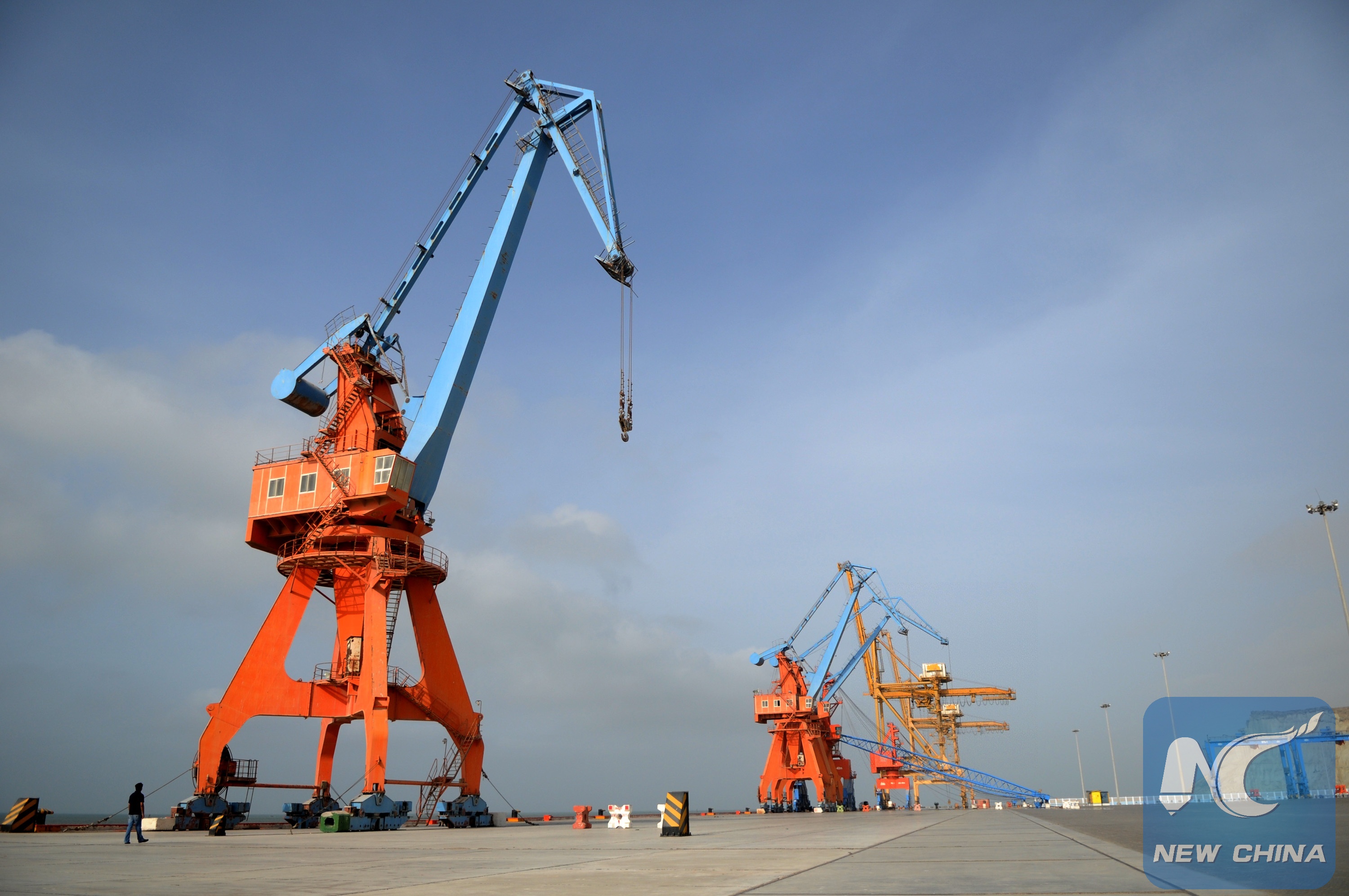
Photo taken on July 2, 2016, shows a view of Gwadar Port in southwest Pakistan. Gwadar Port is a warm-water, deep-sea port situated on the Arabian Sea in Balochistan province of Pakistan. (Xinhua/Ahmad Kamal)
LONDON, Feb. 15 (Xinhua) -- Close cooperation between Pakistan and China is bringing the Belt and Road Initiative into reality in the South Asian country, a senior Pakistani government official told Xinhua, saying it "brings positive changes to the lives of millions of people in Pakistan".
Pakistani Interior Minister Ahsan Iqbal said in a recent interview with Xinhua at the High Commission of Pakistan in London that "the China-Pakistan Economic Corridor (CPEC) is the biggest flagship project of the Belt and Road Initiative".
The 3,000-km-long corridor starts from China's Kashgar in the west and ends at Pakistan's Gwadar, aiming to promote economic cooperation between China and Pakistan in sectors of energy, transportation, infrastructure and industry.
"It is demonstrating to the people that Belt and Road Initiative is not just in speeches, not just in paper, but it is in reality," said Iqbal, who is also the Pakistani minister for planning, development and reforms.
It is "bring really positive change to the lives of millions of people in Pakistan," he said. "And it also assures that our true connectivity."
The multi-billion-dollar CPEC is a long-term, systemic project to promote economic cooperation between Pakistan and China in sectors of energy, transportation, infrastructure and industry.
IMPACT
"CPEC is having a big impact in Pakistan," said the minister. "It has helped significantly in overcoming energy shortage by investment in energy projects. It is helping connect different markets in Pakistan through infrastructure projects."
"And we also hope that through its infrastructure, it will be a bridge between China, Southeast Asia and Central Asia, which has almost 3 billion people," Iqbal said, adding that the people in the region "will benefit from the infrastructure that we are building."
"It will, through economic investment, create new job opportunities, and new job opportunities mean that we will create more foundations for peace and stability," Iqbal said.
In the region, particularly Pakistan and Afghanistan, has not attracted investment in infrastructure and energy since the 9/11 terrorist attack in 2001, Iqbal noted. "So the CPEC is helping us overcome the infrastructure deficit that exists."
"The people of Pakistan believe that China came to Pakistan's help when no one was willing to invest in Pakistan due to security considerations, or due to the negative ratings on Pakistan," he said. "But China proved to be a real friend."
"That is a very important contribution to reviving the local economy and the regional economy," he said.
"CPEC has taken Pakistan-China friendship to the next level," he said. "We have very strong political friendship. But now it has translated into economic partnership."
"After China decided to come, the perception of Pakistan's economy changed," he said. "The government of Pakistan has worked very hard to improve the security situation here."
"There is a very fast improvement in the peace environment and stability in the country" after Pakistan carried out very big security operations against terrorist groups, he said, adding that they also carried out about four million stop-and-search operations.
"We have also placed a 10,000 (security) force for special protection of Chinese who are working on the CPEC projects," he said.
The security force is working in addition to normal police and military units that are deployed to protect the CPEC projects, he said.
GAME CHANGER
"We see CPEC as a game changer for the region, not just Pakistan but for the entire region," Iqbal said, adding that "it is laying foundation for regional cooperation."
The Pakistani minister noted rising protectionism in world trade, saying that "we need to break the walls to create new markets."
"If we build walls, then we will close markets," he said. "We need to create new demand through new markets. And new markets will only open if we break the walls and focus on connectivity, which is the basic principle under the Belt and Road Initiative."
The Belt and Road Initiative aims to achieve policy, infrastructure, trade, financial and people-to-people connectivity along and beyond ancient Silk Road trade routes, thus building a new platform for international cooperation to create new drivers of growth.
"The Initiative is for the good of the world economy," the minister said. "Every country should join Belt and Road Initiative, and help to promote global connectivity and global cooperation for more demand and growth."

